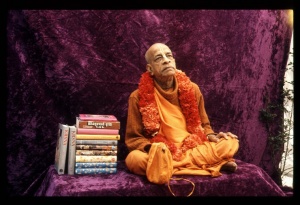SB 5.12.14: Difference between revisions
m (1 revision(s)) |
No edit summary |
||
| Line 1: | Line 1: | ||
{{info | {{info | ||
|speaker= | |speaker=Jaḍa Bharata | ||
|listener=King | |listener=King Rahūgaṇa | ||
}} | }} | ||
[[Category:Srimad-Bhagavatam - Canto 05 Chapter 12]] | |||
[[Category:Bhagavatam Verses Spoken by Jada Bharata - Vanisource|051214]] | |||
<div style="float:left">'''[[Srimad-Bhagavatam]] - [[SB 5|Fifth Canto]] - [[SB 5.12: Conversation Between Maharaja Rahugana and Jada Bharata|Chapter 12: Conversation Between Mahārāja Rahūgaṇa and Jaḍa Bharata]]'''</div> | |||
<div style="float:right">[[File:Go-previous.png|link=SB 5.12.13]] '''[[SB 5.12.13]] - [[SB 5.12.15]]''' [[File:Go-next.png|link=SB 5.12.15]]</div> | |||
{{RandomImage}} | |||
==== TEXT 14 ==== | ==== TEXT 14 ==== | ||
<div class="verse"> | |||
<div | :ahaṁ purā bharato nāma rājā | ||
ahaṁ purā bharato nāma rājā | :vimukta-dṛṣṭa-śruta-saṅga-bandhaḥ | ||
vimukta-dṛṣṭa-śruta-saṅga-bandhaḥ | :ārādhanaṁ bhagavata īhamāno | ||
ārādhanaṁ bhagavata īhamāno | :mṛgo 'bhavaṁ mṛga-saṅgād dhatārthaḥ | ||
mṛgo 'bhavaṁ mṛga-saṅgād dhatārthaḥ | |||
</div> | </div> | ||
| Line 17: | Line 22: | ||
==== SYNONYMS ==== | ==== SYNONYMS ==== | ||
<div class="synonyms"> | |||
<div | ''aham''—I; ''purā''—formerly (in my previous birth); ''bharataḥ nāma rājā''—a King named Mahārāja Bharata; ''vimukta''—liberated from; ''dṛṣṭa-śruta''—by experiencing personally through direct association, or by getting knowledge from the Vedas; ''saṅga-bandhaḥ''—bondage by association; ''ārādhanam''—the worship; ''bhagavataḥ''—of the Supreme Personality of Godhead, Vāsudeva; ''īhamānaḥ''—always performing; ''mṛgaḥ abhavam''—I became a deer; ''mṛga-saṅgāt''—because of my intimate association with a deer; ''hata-arthaḥ''—having neglected the regulative principles in the discharge of devotional service. | ||
</div> | </div> | ||
| Line 25: | Line 29: | ||
==== TRANSLATION ==== | ==== TRANSLATION ==== | ||
<div class="translation"> | |||
<div | |||
In a previous birth I was known as Mahārāja Bharata. I attained perfection by becoming completely detached from material activities through direct experience, and through indirect experience I received understanding from the Vedas. I was fully engaged in the service of the Lord, but due to my misfortune, I became very affectionate to a small deer, so much so that I neglected my spiritual duties. Due to my deep affection for the deer, in my next life I had to accept the body of a deer. | In a previous birth I was known as Mahārāja Bharata. I attained perfection by becoming completely detached from material activities through direct experience, and through indirect experience I received understanding from the Vedas. I was fully engaged in the service of the Lord, but due to my misfortune, I became very affectionate to a small deer, so much so that I neglected my spiritual duties. Due to my deep affection for the deer, in my next life I had to accept the body of a deer. | ||
</div> | </div> | ||
| Line 32: | Line 35: | ||
==== PURPORT ==== | ==== PURPORT ==== | ||
<div class="purport"> | |||
The incident herein described is very significant. In a previous verse it is stated, ''vinā mahat-pāda-rajo-'bhiṣekam'': one cannot attain perfection without smearing the dust from the lotus feet of an exalted devotee on his head. If one always follows the orders of the spiritual master, there is no question of falling down. As soon as a foolish disciple tries to overtake his spiritual master and becomes ambitious to occupy his post, he immediately falls down. ''Yasya prasādād bhagavat-prasādo yasyāprasādān na gatiḥ kuto 'pi.'' If the spiritual master is considered an ordinary man, the disciple surely loses his chance to advance further. Despite a very rigid life in devotional service, Bharata Mahārāja did not consult a spiritual master when he became overly attached to a deer. Consequently he became strongly attached to the deer, and, forgetting his spiritual routine, he fell down. | |||
</div> | |||
<div | <div style="float:right; clear:both;">[[File:Go-previous.png|link=SB 5.12.13]] '''[[SB 5.12.13]] - [[SB 5.12.15]]''' [[File:Go-next.png|link=SB 5.12.15]]</div> | ||
__NOTOC__ | |||
</div> | __NOEDITSECTION__ | ||
__NOTOC__ | |||
Revision as of 05:01, 16 May 2021

A.C. Bhaktivedanta Swami Prabhupada
TEXT 14
- ahaṁ purā bharato nāma rājā
- vimukta-dṛṣṭa-śruta-saṅga-bandhaḥ
- ārādhanaṁ bhagavata īhamāno
- mṛgo 'bhavaṁ mṛga-saṅgād dhatārthaḥ
SYNONYMS
aham—I; purā—formerly (in my previous birth); bharataḥ nāma rājā—a King named Mahārāja Bharata; vimukta—liberated from; dṛṣṭa-śruta—by experiencing personally through direct association, or by getting knowledge from the Vedas; saṅga-bandhaḥ—bondage by association; ārādhanam—the worship; bhagavataḥ—of the Supreme Personality of Godhead, Vāsudeva; īhamānaḥ—always performing; mṛgaḥ abhavam—I became a deer; mṛga-saṅgāt—because of my intimate association with a deer; hata-arthaḥ—having neglected the regulative principles in the discharge of devotional service.
TRANSLATION
In a previous birth I was known as Mahārāja Bharata. I attained perfection by becoming completely detached from material activities through direct experience, and through indirect experience I received understanding from the Vedas. I was fully engaged in the service of the Lord, but due to my misfortune, I became very affectionate to a small deer, so much so that I neglected my spiritual duties. Due to my deep affection for the deer, in my next life I had to accept the body of a deer.
PURPORT
The incident herein described is very significant. In a previous verse it is stated, vinā mahat-pāda-rajo-'bhiṣekam: one cannot attain perfection without smearing the dust from the lotus feet of an exalted devotee on his head. If one always follows the orders of the spiritual master, there is no question of falling down. As soon as a foolish disciple tries to overtake his spiritual master and becomes ambitious to occupy his post, he immediately falls down. Yasya prasādād bhagavat-prasādo yasyāprasādān na gatiḥ kuto 'pi. If the spiritual master is considered an ordinary man, the disciple surely loses his chance to advance further. Despite a very rigid life in devotional service, Bharata Mahārāja did not consult a spiritual master when he became overly attached to a deer. Consequently he became strongly attached to the deer, and, forgetting his spiritual routine, he fell down.